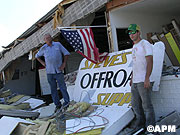September 8, 2005
 |
| Relief supplies wait for distrubution on Thursday in Covington, Louisiana, at a Red Cross distribution center in the aftermath of Hurricane Katrina. (PAUL J. RICHARDS/AFP/Getty Images ) |
St. Paul, Minn. — (AP) Debbie Griffin was just getting on her feet in New Orleans when Hurricane Katrina hit. Now she's starting over again.
The 41-year-old arrived in the Twin Cities about 1:30 a.m. Tuesday with the clothes on her back and $55 to her name.
"I'm not homeless anymore," Griffin said Thursday, during a visit to the Minneapolis chapter of the Red Cross. "I've got my own bed."
Griffin was among the 116 Katrina refugees who had been helped by the Minneapolis Red Cross as of Thursday morning, and more trickled in throughout the day. The total in the state will jump considerably next Tuesday, state officials said, when up to 500 evacuees are expected to arrive at Camp Ripley in the first wave of a 21-state relocation plan.
There the storm survivors will be registered, go through medical screening and housed there before being placed in long-term housing.
Griffin already has a jump on them. "She has a place as long as she needs it," said Anne Varberg, who along with her 10-year-old daughter Woody is hosting Griffin in her Minneapolis home after making the connection through a local aid organization.
Griffin had only lived in New Orleans since early June, having moved there from Florida to get a fresh start on life. She was staying in a homeless shelter on Magazine Street, but had recently started a job at JC Penney and had an appointment to see an apartment a few days before Katrina struck.
On the morning of Sunday, Aug. 29, about 24 hours before the hurricane made landfall, the shelter residents were evacuated to the Superdome. At the time, Griffin didn't grasp how bad it would get, so she left most of her belongings at the shelter - including her prized Bible, most of her clothes and a few other important possessions.
She spent the next four days at the Superdome, watching the situation deteriorate by the hour.
"The smell was awful," Griffin said. "They didn't keep the bathrooms up. There was no running water. Food, you had to wait an hour in line minimum - usually longer."
The military guards in the Superdome - Griffin's not sure what organization they represented - were of little comfort, she said.
"There was a lot of anxiety in there, and they made it worse," she said. "They were very nasty, outright rude. You'd think there would have been a little love and understanding for people who left their homes."
On Thursday, Sept. 1, Griffin was in a group of New Orleans residents transferred to Houston's Astrodome. Conditions there were much better, she said: "They treated us well."
But the following Sunday, when she heard of a bus that was taking a group of passengers north.
"They said, 'Who wants to go to Minneapolis, Minnesota?"' said Griffin, who'd never been to the state. "I said, 'That sounds OK - let's go!"'
Varberg, a bus driver, had offered her home on an Internet message board and was put in contact with Griffin through a local aid group. Thursday, after spending just two days together, the two sounded like old friends.
"I feel like I'm at home with her," Griffin said. "I feel like she's my sister."
Now, with her $55 in a new checking account - TCF waived the minimum balance requirement - and $360 on a Red Cross debit card, Griffin is ready to start a new life here. She wants to eventually go back to school and become a teacher.
But first Varberg wants her to get ready for winter.
"We've been talking about Thinsulate, and merino wool, and down, and thick boots," Varberg said.
FEWER THAN EXPECTED
Minnesota officials received word Thursday that the first wave of Hurricane Katrina survivors should arrive at Camp Ripley next Tuesday as part of a 21-state relocation plan.
The Federal Emergency Management Agency told the state to expect up to 500 evacuees.
"Minnesota is prepared and ready to welcome hurricane survivors," said Michael Campion, commissioner of the Department of Public Safety. "Our state is committed to helping these survivors through this difficult time.
Camp Ripley, a Minnesota National Guard base near Little Falls, has been designated as the primary receiving point. Storm survivors will be registered, go through emergency screening and housed there before being placed in longer-term housing.
Minnesota officials say they have room for more than 3,500 Katrina victims at once at the facility, but they don't expect it to reach capacity.




